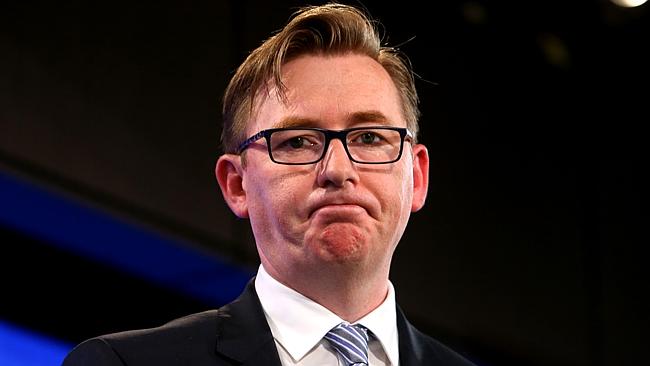HEALTH bodies are demanding a radical review of the private health system as health fund premiums skyrocket, hospitals price gouge and funds slash benefits.
Australian Medical Association president Professor Brian Owler demanded federal government intervention yesterday as he revealed NIB had removed over 225 items from its schedule of medical benefits.
He attacked Medibank over its attempt to exclude 165 treatments from hospital contracts and said the fund was no longer covering spinal fusion and bariatric surgery under its Private Basic and Standard Hospital policies.
The changes were serious enough to “warrant strong and swift intervention by the Federal Government before consumer confidence in the private sector is undermined, such that people drop their private cover altogether and/or turn to the public hospital sector for treatment,” Professor Owler said.

Not happy … Professor Brian Owler President of the AMA says private health is under threat as health funds slash benefits. Source: News Corp Australia
Health fund representative group HIRMAA is calling for an inquiry into private hospital price gouging on prostheses like hip replacements which cost 70 per cent more than in a public hospital.
The Consumer’s Health Forum says it wants a wholesale review of private health insurance and is expecting the government to announce one soon.
“There are some worrying developments that are rapidly eroding consumer confidence and bring into serious question the value of private health insurance,” Consumer’s Health Forum chief Leanne Wells said.
“Developments such as the eleventh hour resolution of the Medibank-Calvary dispute has provided little comfort and reports of downgrading of policies and changes to benefits without the knowledge of policy holders do nothing but add to this,” she said.

High-profile dispute … Last month Medibank tried to axe benefits for 165 procedures at Calvary hospitals. Picture: Supplied Source: Supplied
“Private health insurance premiums are becoming a greater drain on household budgets. Consumers deserve a better deal — one that delivers value to them as policy holders but better access and standards of care as well, otherwise what are they paying for?”
Medical Technology Association of Australia says it expects the government to announce an inquiry soon and it’s willing to take part.
Health Minister Sussan Ley said she was happy to hear industry proposals to improve the viability of the sector, however her focus “first and foremost” was on improving affordability for consumers.
Last month the Private Health Insurance Ombudsman David McGregor revealed complaints regarding health fund products is at its highest level in more than a decade with the three big funds BUPA, Medibank and HCF copping the most criticism.
And Private Health Insurance Administration Council shows half of all health fund policy holders now hold policies that exclude certain benefits.
Professor Owler told the Ramsay hospital manager conference yesterday his members hear frequent reports of insurers cold-calling policy holders, encouraging them to downgrade their cover to reduce their premiums — and without a clear explanation.

Examination needed … Health groups want a “root and branch review” of private health. Picture: Getty Images Source: Getty Images
“They are blatantly about avoiding paying benefits for the treatments that people need, and expect to be covered for,” he said.
As recently as last month, one of Professor Owler’s patients with a 20-year history of spinal complaint, and who now requires spinal fusion, was shocked to find her NIB policy no longer covered that treatment, he said.
“She is adamant that she did not receive advice from NIB that her cover had changed. She is now serving a 12-month waiting period with another insurer, and doing so in substantial pain.”
NIB said yesterday it had made a series of changes in June that saw the fund cap its medical gap benefits at 150 per cent of the Medicare schedule fee, many benefits will be capped at just 100-125 per cent of the Medicare fee.
It claims “no customer benefits have been cut”.
And a Medibank spokesperson said it was responding to increasing cost of healthcare by providing more affordable health insurance options that are specifically tailored to members’ needs.
“This often means excluding things they don’t think they’ll need like obstetrics or weight loss (bariatric) surgery,” the spokesperson said.
“As a result, Medibank will be removing weight loss surgery cover from our Basic and Standard Hospital Covers and spinal fusion surgery from our Basic Hospital Cover from 28 September 2015.
“Basic Hospital members will still be covered for common spinal treatments, such as herniated or slipped discs and spinal fusion surgery as a result of accidents under their accident cover.”
Its members will also still be able to access weight loss and spinal fusion surgeries on other Medibank policies, the fund said.

Unwelcome surprise … Health fund NIB has capped the amount it will pay for hundreds of medical procedures. Picture: Supplied Source: Supplied
The government, the industry and doctors need to work together to drive quality improvements in the system and find ways to keep premium rises under control, Professor Owler said.
The AMA president is calling on the government and health funds to back and pay for the establishment of a series of medical device and treatment registries to find the best quality treatments.
The registries can be based on a clinical condition or diagnosis, or on a procedure.
Every operation and implant would be recorded and the revision rates, infection rates, would all be analysed by surgeon and unit.
That information could then be provided to surgeons and hospital units so that they could benchmark their performance rate against their peers.
Underperforming individuals and units would then be motivated to change their practice and the changes would improve the quality of care for patients and save money by weeding out poor practices and devices.
